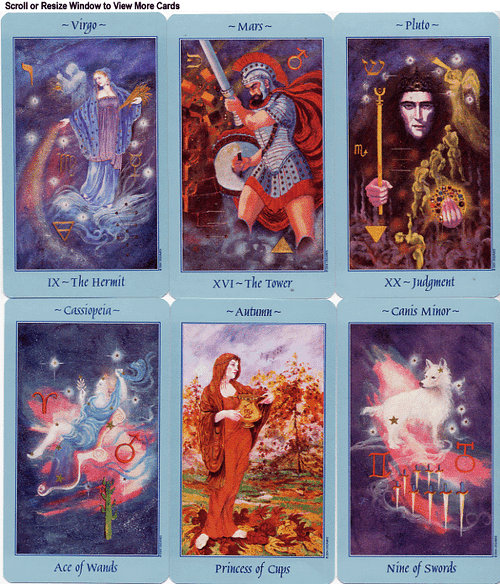The Celestial Tarot is a unique and intricate deck that extends beyond mere divination. It delves into the spiritual and metaphysical, intertwining concepts from both tarot and astrological symbology. Within a Christian context, tarot cards like these can provoke myriad interpretations, often leading individuals to ponder significant theological questions. This article examines the Celestial Tarot card meanings through a Christian lens, exploring the intersections of belief, divination, and spiritual discernment.
Understanding the Celestial Tarot
At its core, the Celestial Tarot combines traditional tarot archetypes with celestial themes, drawing significantly on astrological symbolism. Each card encapsulates not only archetypal narratives but also cosmic principles. This melding invites those who hold a Christian perspective to reflect on deeper spiritual truths and divine messages.
The Archetypes: Universal Themes
The 22 Major Arcana cards are pivotal in tarot reading. Each card can be seen as a vessel for universal truths. From a Christian standpoint, these archetypes can evoke parallels with Biblical figures, parables, and teachings. For instance, The Fool can represent innocent faith, akin to the childlike faith Christ mentioned in the Gospels. Such comparisons can stimulate profound contemplation about the divine narrative that Christians believe they are part of.
Certain Elements and Symbolism
In the Celestial Tarot, elements like the sun, moon, and stars are prominent. The sun may symbolize new beginnings and divine illumination—a concept echoed in Christian scripture, where light often signifies God’s presence (e.g., John 8:12). The moon may stand for mystery and the subconscious, echoing themes of introspection found within the contemplative traditions of Christianity.
Furthermore, the presence of the zodiac in the Celestial Tarot invites an exploration of God’s creation. The astrological connections might remind Christians of Genesis, wherein God appoints the celestial bodies to govern time and seasons. This invites readers to consider how each card may reflect God’s divine order and the role of humanity within it.
Ethical Considerations: Tarot and Christian Faith
From a Christian perspective, engaging with tarot raises ethical considerations. Many Christians contend that tarot is incompatible with Biblical teachings, viewing it as a form of divination that detracts from reliance on God. However, others assert that tarot can be a tool for spiritual reflection rather than a means of prediction or fortune-telling.
This dichotomy invites contemplation about the purpose of tarot. If used as a tool for self-examination and growth, its interpretations might facilitate a deeper understanding of one’s faith journey. Intriguingly, each card could serve as a metaphorical mirror, prompting dialogue with the self about one’s relationship with the divine.
Specific Card Interpretations: Celestial Tarot in a Christian Context
Let us delve into specific cards within the Celestial Tarot, elucidating their meanings while contemplating their implications within a Christian framework.
The Star (XVII)
In the Celestial Tarot, The Star represents hope, faith, and divine guidance. This card resonates profoundly within Christian doctrine as it echoes the assurance offered by scriptures such as Jeremiah 29:11, which fosters confidence in God’s plans for humanity. It evokes the image of the Star of Bethlehem, guiding the wise men, symbolizing divine providence leading one toward fulfillment and assurance.
The High Priestess (II)
The High Priestess embodies intuition, wisdom, and the unconscious mind. Within a Christian context, she represents the vital role of the Holy Spirit, whose guidance leads believers to discernment and understanding. This card invites contemplation about spiritual wisdom that comes from prayer and meditation, encouraging a deeper connection with God’s will.
Judgment (XX)
The Judgment card speaks to resurrection, renewal, and spiritual awakening. It provokes reflections on the Christian theme of redemption and the Last Judgment. This card encourages believers to examine their souls, the call to repentance, and the ultimate promise of eternal life through Jesus Christ. It serves as a reminder of the transformative power of grace and the ongoing journey toward sanctification.
How to Approach the Celestial Tarot with an Open Heart
For those within a Christian framework exploring the Celestial Tarot, the approach can be grounded in prayerful discernment. It is essential to approach tarot not as an oracle of fate but as a series of prompts for reflection. By inviting the Holy Spirit into the process, individuals can discover meaningful interpretations that align with their faith journey.
Engagement with the Celestial Tarot can cultivate a richer understanding of one’s spiritual landscape, enabling readers to glean insights into challenges, aspirations, and divine encounters. It can serve as a catalyst for exploring the profound mysteries of the Christian faith through a unique and creative lens.
Conclusion
The exploration of Celestial Tarot within a Christian context opens avenues for dialogue between faith and divination. While tarot traditionally occupies a space of spiritual inquiry that may clash with conservative beliefs, it can also serve as a bridge to deeper understanding and personal reflection. By embracing a thoughtful and discerning approach, one can navigate the often-turbulent waters of spirituality, veneration, and modern practice, ultimately enriching one’s faith journey.







Leave a Comment